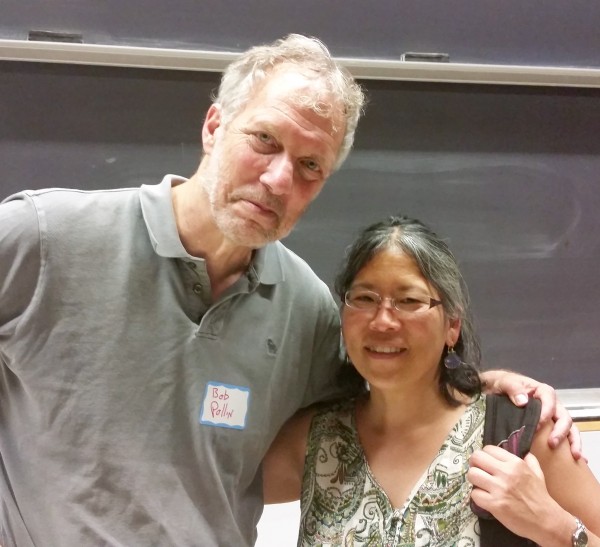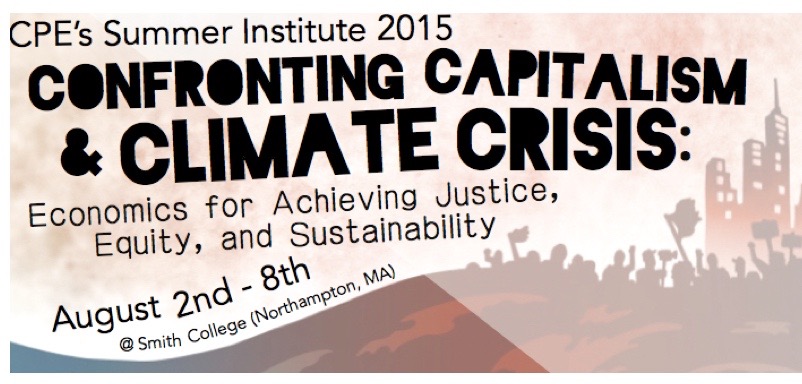
Can Capitalism be tamed? Can Capitalism become more caring and socially responsible?
These are the questions Dr. Emily Kawano asked and attempted to answer as the other half of the opening plenary at the Center for Popular Economics 2015 Summer Institute in Northhampton MA, which I am attending all this week. Robert Pollin gave the other half of the plenary talk, and I wrote about that first, because it seemed to relate more to the recent news that Governor Gina Raimondo was announcing a new fracked gas energy plant to be built in Burrillville, RI. But I didn’t want to pass up the opportunity to write about Kawano’s talk, which was eye opening and filled with possibilities.
Emily Kawano has a doctorate in economics and is the coordinator of the U.S. Solidarity Economy Network and co-director of Wellspring Cooperative. She spoke about transforming our economic system from capitalism to what she calls the solidarity economy.
The biggest problem facing our society is climate change, fueled by capitalism. Kawano mentioned the book The Sixth Extinction: An Unnatural History by Elizabeth Kolbert, which covers past mass extinctions (like the one that killed the dinosaurs) and argues that we are living through the sixth extinction now, and that the cause of this extinction is humanity, not a stray asteroid.
So, can Capitalism be tamed before the worst effects of climate change damage the planet beyond repair? Kawano thinks not. Capitalism can be reigned in, but that’s not enough. What is needed in a “big shift in our paradigm, a different way of being with each other and the earth and nature,” says Kawano.
We need a solidarity economy.
A solidarity economy is based on values and principles such as solidarity, cooperation, mutualism, sustainability, democracy, equity and pluralism.
The kinds of things that scare the crap out of capitalists.
A solidarity economy focuses on living well and living in harmony with each other and the natural world. It is, says Kawano, “a different way of thinking about the economy.”
The rights of the natural world, people, animals, insects, water, even life itself, would be prioritized. Human social creations, such as knowledge, spirituality (what a Humanist might call conscience) and art would be freely shared.
Governance would include such revolutionary ideas as participatory budgeting, community led development, collective ownership, regulation, restorative justice and democracy. In a solidarity economy unpaid work, such as the care provided by parents for children and families for the elderly, would be considered as part of the economy as a whole. Banks would be public institutions.
It all sounds like a utopian fairy tale, until you consider that once upon a time, a government that guaranteed free speech, freedom of assembly and freedom of religion also sounded impossible.
The concepts of a solidarity economy have been built into the constitutions of Ecuador and Bolivia. There are solidarity economy ministries in Brazil, France and Luxembourg. There is a United Nations task force examining these ideas, as well as the ILO (International Labor Organization).
The environmental encyclical of Pope Francis, Laudato Si’, is full of solidarity economy-like talk.
Climate change is coming fast. Economic planning is the most effective way to shift economies, markets are slow by comparison. Think about WWII, when the economy switched from a civilian to a war economy. That wasn’t markets reacting to end fascism, that was governmental policy.
The solidarity economy is about taking all these different systems, ideas and grassroots work and trying “to pull them together,” says Kawano. “The mainstream economy isn’t seeing it.”
On the local and grassroots level Kawano is talking about networks of worker-owned businesses, job creation in marginalized communities, local purchasing from anchor institutions and de-commodification through community land trusts, to name just a few ideas.
It turns out that economic revolution, like mass extinction, is hard to see from the inside. Did the people living through the end of feudalism and the beginnings of capitalism understand what was happening? Not really. They were buffeted by forces they could not understand or control, and the end result was unparalleled economic growth combined with environmental disaster.
If we had a chance to do it again, we would make different choices. That’s the solidarity economy.



Deprecated: Function get_magic_quotes_gpc() is deprecated in /hermes/bosnacweb08/bosnacweb08bf/b1577/ipg.rifuturecom/RIFutureNew/wp-includes/formatting.php on line 4387
Deprecated: Function get_magic_quotes_gpc() is deprecated in /hermes/bosnacweb08/bosnacweb08bf/b1577/ipg.rifuturecom/RIFutureNew/wp-includes/formatting.php on line 4387
Deprecated: Function get_magic_quotes_gpc() is deprecated in /hermes/bosnacweb08/bosnacweb08bf/b1577/ipg.rifuturecom/RIFutureNew/wp-includes/formatting.php on line 4387